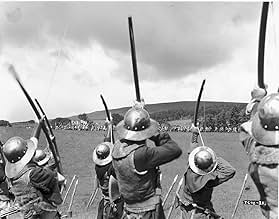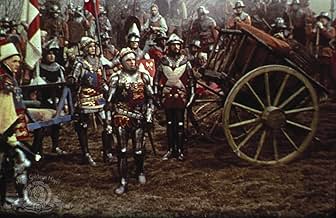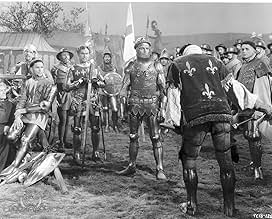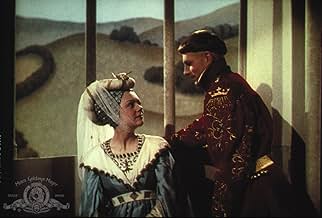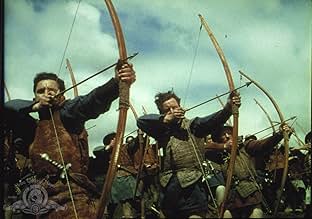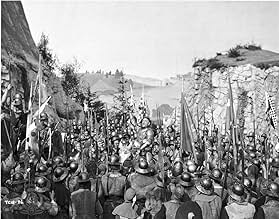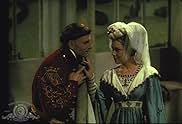Henry V
Titre original : The Chronicle History of King Henry the Fifth with His Battell Fought at Agincourt in France
- 1944
- Tous publics
- 2h 17min
NOTE IMDb
7,0/10
7,5 k
MA NOTE
En plein coeur de la Guerre de Cent Ans, le jeune Roi Henry V d'Angleterre se lance dans la conquête de la France en 1415.En plein coeur de la Guerre de Cent Ans, le jeune Roi Henry V d'Angleterre se lance dans la conquête de la France en 1415.En plein coeur de la Guerre de Cent Ans, le jeune Roi Henry V d'Angleterre se lance dans la conquête de la France en 1415.
- Réalisation
- Scénario
- Casting principal
- Nommé pour 4 Oscars
- 12 victoires et 6 nominations au total
Avis à la une
This is seriously fantastic stuff. As many others will know by now, I am a huge fan of Laurence Olivier's work, but this inspirational and revelatory performance surpasses all. The first and most important thing is the timing. Incredible!! Olivier managed to get the whole thing together in time for D-Day! (sorry, that was not quite relevant) The fact is, his portrayal of King Henry V had a deliberate purpose to it... he wanted to give England courage in the war they were fighting, just as King Harry had courage against the french.
Everything, the sets, the colours, all are so majestic and wonderfully theatrical. That's because Olivier did not want to keep his audience on the indifferent grounds of reality. For many in 1944, winning the war was something totally out of reality, just as it was so for the English at the battle of Agincourt. Olivier wished to transport his audience to the god-given victory, and transport them he did. "Once more unto the breach!" Even as a little fourteen-year-old viewer of Sir Laurence speaking these famous words this gave me the curious inspiration... the same that it gave to Winston Churchill sixty years ago. For me, I don't know what the inspiration was for. For Churchill, it was claiming victory in world war 2.
Whatever your taste, background, or personality; this film is inspirational, and recommended viewing for everyone. You would be missing something terrible if you did not see this pure patron of an actor grace the screen majestically with his regal inspiration.
Everything, the sets, the colours, all are so majestic and wonderfully theatrical. That's because Olivier did not want to keep his audience on the indifferent grounds of reality. For many in 1944, winning the war was something totally out of reality, just as it was so for the English at the battle of Agincourt. Olivier wished to transport his audience to the god-given victory, and transport them he did. "Once more unto the breach!" Even as a little fourteen-year-old viewer of Sir Laurence speaking these famous words this gave me the curious inspiration... the same that it gave to Winston Churchill sixty years ago. For me, I don't know what the inspiration was for. For Churchill, it was claiming victory in world war 2.
Whatever your taste, background, or personality; this film is inspirational, and recommended viewing for everyone. You would be missing something terrible if you did not see this pure patron of an actor grace the screen majestically with his regal inspiration.
It's a splendid rendering based on Shakespeare play with a nice staging , dealing with the warrior king Henry V and his grand victory at the battle of Agincourt on St. Crispin's Day, October 15, 1415 . The movie begins with an ingenious initiation , the camera from a first general shot on the background lead us until a foreground where some actors are playing at the Glove theater in 1600 , then several dramatic scenes take place and eventually going back to the Globe for the final scenes . The film is alrightly based on historic events well made by filmmaker and star Sir Laurence Olivier. They are the following ones : Henry V vanquishes Charles VI in Agincourt (1415) and took over Normandy . Charles VI of France signs Troyes treatise in what Henry V is wedded to Charles's daughter . His descendant Heny VI of England will proclaim himself King of France but Charles VII (anterior Delphin) will be crowned king of France in Reims and the ¨100 years war¨ going on until 1453 (date of downfall Byzance).Grand staging of the Shakespearean play of King Henry V .
This is the first of three principal movies directed by Laurence Olivier along with ¨Hamlet¨ and ¨Richard III¨ based on Shakespeare plays . It's an astounding , stirring , stunning and thoughtful film with glimmer , glittering , colorful cinematography and splendid costume . Partly intended as a wartime morale-booster for the British . Certain parts of the play were consequently omitted , such as Henry's hanging of a friend as an example of firm justice . Laurence Olivier won a honorary and special Oscar for his producing , directing and acting in bringing English history part to vivid life of the screen made with pageantry and perfection . The excellent secondary cast is completed with usual players of the English stage theater and films with important careers : Leo Genn (Quo Vadis) , Leslie Banks (Jamaica inn) , Robert Newton (Treasure's island) , Ralph Truman (El Cid) , Felix Aylmer (Ivanhoe) , Ernest Thesiger (Bride of Frankestein) , Neal McGinnis (Jason and the Argonauts) , Freda Jackson (Brides of Dracula). The especial departments are outstanding , thus : Robert Furse in wardrobe and costumes , the classical musician William Walton and the photographer of superproductions Robert Krasker . Rating : Good and notable . Well worth seeing.
This is the first of three principal movies directed by Laurence Olivier along with ¨Hamlet¨ and ¨Richard III¨ based on Shakespeare plays . It's an astounding , stirring , stunning and thoughtful film with glimmer , glittering , colorful cinematography and splendid costume . Partly intended as a wartime morale-booster for the British . Certain parts of the play were consequently omitted , such as Henry's hanging of a friend as an example of firm justice . Laurence Olivier won a honorary and special Oscar for his producing , directing and acting in bringing English history part to vivid life of the screen made with pageantry and perfection . The excellent secondary cast is completed with usual players of the English stage theater and films with important careers : Leo Genn (Quo Vadis) , Leslie Banks (Jamaica inn) , Robert Newton (Treasure's island) , Ralph Truman (El Cid) , Felix Aylmer (Ivanhoe) , Ernest Thesiger (Bride of Frankestein) , Neal McGinnis (Jason and the Argonauts) , Freda Jackson (Brides of Dracula). The especial departments are outstanding , thus : Robert Furse in wardrobe and costumes , the classical musician William Walton and the photographer of superproductions Robert Krasker . Rating : Good and notable . Well worth seeing.
I saw a modern remake of this film, 1989, recently with Kenneth Branagh. The battle showed sweat and blood, a non-theatrical production in comparison to this 1944, very theatrical, Olivier production. Some reviewers denounce the heavy-handed acting of 1944, but I find it charming.
Olivier has an economical charisma. His acting has few flourishes, but his voice says everything. Olivier in period costume is mesmerizing. As Shakespeare's bad-boy prince turned earnest King, Olivier takes charge and demands the return of English lands from the rather effeminate French nobility. Outnumbered 10 to one, his merry band of Englishmen dispatches the Dolphin at Agincourt. Then he courts the French speaking princess Katherine with broken French and economy.
The recreation of old London and the Globe Theatre was delightful. The audience and players went on in heavy rains without complaint. The mention of Falstaff's name is enough to get applause, though the buffoon has only a short death scene.
I do believe the play has been abridged. Many of the longer speeches seem shortened. Still, this is accessible Shakespeare. How can you go wrong? Never!
Olivier has an economical charisma. His acting has few flourishes, but his voice says everything. Olivier in period costume is mesmerizing. As Shakespeare's bad-boy prince turned earnest King, Olivier takes charge and demands the return of English lands from the rather effeminate French nobility. Outnumbered 10 to one, his merry band of Englishmen dispatches the Dolphin at Agincourt. Then he courts the French speaking princess Katherine with broken French and economy.
The recreation of old London and the Globe Theatre was delightful. The audience and players went on in heavy rains without complaint. The mention of Falstaff's name is enough to get applause, though the buffoon has only a short death scene.
I do believe the play has been abridged. Many of the longer speeches seem shortened. Still, this is accessible Shakespeare. How can you go wrong? Never!
Olivier was asked by his government to make this film during the second world war to raise the morale of civilians and troops alike. He abstained from showing excessive blood and gore, used the language of Shakespeare brilliantly and achieved his mission. I have seen this film many times and it never fails to thrill me. The story line is commonly known, we know how happily it came out in the end. It was the first Shakespearian play made on film in color and enthralled all who saw it.
With tensions between England and the arrogant French pushed to breaking point, King Henry the Fifth sets out with his armies to conquer and quell the French in their native land. The film builds up with to the historic battle of Agincourt with the troops and the king camping together and making progress across the land.
Whenever Henry V (to use the shorten title) comes on TV I always tape it simply because I always assume that it is a masterpiece of English cinema such is it's reputation in many circles. However this reputation may not be that well deserved as I have decided from my viewing of it today. The plot is Shakespeare and I will not criticise it, but I know myself that it is not a story that I would pick if asked to chose from his canon of work I prefer the darker stuff or the out and out comedies. That aside the film tells a straightforward tale, here used to raise morale and fly the flag of Britain and England during WWII. As such it works but I needed it to be more than just a flag waving exercise, I wanted more detail and more thought. Such scenes exist within the play but Olivier does not use them as well as he uses the grandstanding speeches and battle scene his focus is not on thought but on scale.
As director he does quite well in early stages and in the actual battle itself. The device of opening ad closing in the playhouse works to good effect and is clever but far too many scenes have poor camera angles or are poorly framed. The battle scene is good but too much of the film is ordinary in terms of looks and style. As actor Olivier carries the King well but is too one dimensional for me and I didn't have to put any thought into him to watch the film. He holds back for much of the film but leaps up for more upbeat scenes or rousing speeches. The support cast all sound natural with the dialogue although some of the roles are a little bit hammy, they still hold the film together well.
Overall this is an enjoyable film that has good spectacle to it and key scenes are very good. However the lack of anything under the surface is a problem and it is one of the lesser Shakespearean adaptations I have seen. Still worth a look but if you're like me, you'll be left wondering `was that it?'
Whenever Henry V (to use the shorten title) comes on TV I always tape it simply because I always assume that it is a masterpiece of English cinema such is it's reputation in many circles. However this reputation may not be that well deserved as I have decided from my viewing of it today. The plot is Shakespeare and I will not criticise it, but I know myself that it is not a story that I would pick if asked to chose from his canon of work I prefer the darker stuff or the out and out comedies. That aside the film tells a straightforward tale, here used to raise morale and fly the flag of Britain and England during WWII. As such it works but I needed it to be more than just a flag waving exercise, I wanted more detail and more thought. Such scenes exist within the play but Olivier does not use them as well as he uses the grandstanding speeches and battle scene his focus is not on thought but on scale.
As director he does quite well in early stages and in the actual battle itself. The device of opening ad closing in the playhouse works to good effect and is clever but far too many scenes have poor camera angles or are poorly framed. The battle scene is good but too much of the film is ordinary in terms of looks and style. As actor Olivier carries the King well but is too one dimensional for me and I didn't have to put any thought into him to watch the film. He holds back for much of the film but leaps up for more upbeat scenes or rousing speeches. The support cast all sound natural with the dialogue although some of the roles are a little bit hammy, they still hold the film together well.
Overall this is an enjoyable film that has good spectacle to it and key scenes are very good. However the lack of anything under the surface is a problem and it is one of the lesser Shakespearean adaptations I have seen. Still worth a look but if you're like me, you'll be left wondering `was that it?'
Le saviez-vous
- AnecdotesThe opening model shot of London was huge, 50 feet by 70 feet in size, and made of plaster. It took four months to construct.
- GaffesHenry V's reign was in the early 1400s, but most of the costuming in the film is from 1600, the time of the plays writing, almost 200 years later. The armor on the other hand is accurate. In fact, there is no anachronism in the costumes. The story is told from two points of view (one in the 1600s, as a performance in the Globe Theater; the other in the 1400s, as the characters originally lived). Costumes shift on purpose according to the point of view.
- Citations
King Henry V of England: Tell the Dauphin his jest will savor but of shallow wit, when thousands weep more than did laugh at it.
- Crédits fousThe main title not only gives the full title of the play as William Shakespeare wrote it, but spells the words in the 16th-century manner, not in modern spelling.
- Versions alternativesIn the American release of the film, all references to "bastards" in the dialogue were excised.
- ConnexionsEdited into Le Maître du monde (1961)
- Bandes originalesAgincourt Hymn (Deo gracias Anglia)
(uncredited)
Latin hymn text set to anonymous tune (1415)
Arranged by William Walton
Meilleurs choix
Connectez-vous pour évaluer et suivre la liste de favoris afin de recevoir des recommandations personnalisées
- How long is Henry V?Alimenté par Alexa
Détails
Box-office
- Budget
- 475 000 £GB (estimé)
- Montant brut mondial
- 62 619 $US
- Durée2 heures 17 minutes
- Mixage
- Rapport de forme
- 1.37 : 1
Contribuer à cette page
Suggérer une modification ou ajouter du contenu manquant




